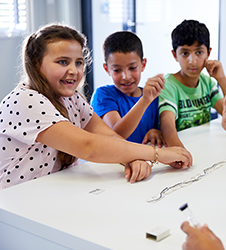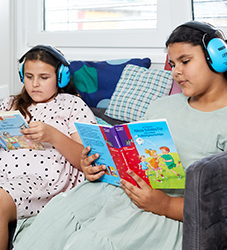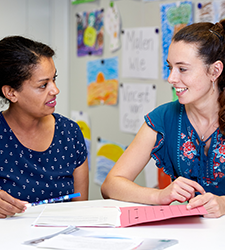Projects
Adaptive Education
To the project browser
MultiDynAssess-India
The project designs, implements, and evaluates multilingual dynamic assessment (DA) in Indian primary government schools where English is taught in a context characterised by high sociolinguistic diversity and widespread code-mixing practices. It investigates how multilingual versus English-only DA affects Grade 4 students’ language and content learning over time, drawing on classroom observations and a longitudinal comparison with traditional static assessment in schools in New Delhi and Guwahati. By aligning assessment with learners’ full linguistic repertoires, the project aims to promote equity in education and offers implications for multilingual assessment practices in India and other linguistically diverse contexts in the Global South.

MultiDiskurs
The project aims to account for patterns of variation in the processing of linguistic structures in discourse. In particular, we investigate how bilingual children ranging in age from 8 to 12 integrate morphosyntactic and discourse information, for example by using eye-tracking experiments. Among the factors that contribute to individual variation, we explore the role of cross-linguistic influence, differences in bilingual profiles in terms of language and literacy exposure, individual cognitive skills and bilinguals’ ability to share discourse strategies across their two languages.

KaKoTex
The project KaKoTex investigates how grammatical features of texts and individual characteristics of the readers (e.g. multilingualism) affect text comprehension in 4th grade. The focus is on the comprehension of linguistic means for marking cause-consequence relationships, so-called causal connectives (e.g. because, therefore). The project aims to find out (i) whether explicit marking of causal relations facilitates text comprehension, (ii) for which causal connectors this holds, and (iii) which students benefit from it.

TeWiPrax
In the TeWiPrax project, researchers and teachers from the group „Sprachförderung/Mehrsprachigkeit“ of the “Campusschulen” program collaboratively develop and test materials that support secondary school students in understanding scientific texts. A particular focus is on academic and subject-specific vocabulary.

BRISE-School Readiness
The sub-project of the second project phase (2025–2029) at DIPF is dedicated to the effects of the early childhood support chain on the development of basic skills in reading, spelling and arithmetic over the course of the primary school years.

Rocket
The Rocket project investigates the relationships between orthographic knowledge and individual reading and spelling development in German-speaking second graders. The project will also investigate other relevant predictors of written language acquisition, such as phonological awareness, auditory memory and naming speed. The planned longitudinal analysis will contribute to a better understanding of the role of orthographic knowledge in the development of reading and spelling performance.

MotivO
Project MotivO aims at investigating and comparing motivational aspects of reading achievement across orthographies (German vs. Hebrew). Within the context of a cooperation project, German and Israeli 2nd and 4th Graders will be compared regarding their reading motivation and reading achievement in a cross-language research design to detect positive or negative feelings towards reading as well as changes across time.

LEGA
The LEGA project analyses the use of reading strategies by primary school children. It compares the use of reading strategies between class levels and relates this to existing vocabulary and contextual information. The aim is to find out more about the conditions under which efficient (retrieval) strategies, which are important for fluent reading, are used and how this use can be supported.

KonText
The KonText project investigates how grammatical features of texts and individual characteristics of readers (e.g. multilingualism) influence text comprehension. The focus is on the comprehension of linguistic means of indicating basic sequential relationships, so-called causal connectors (e.g. because, since, therefore). The project aims to find out (i) whether explicit labelling of causal relations facilitates text comprehension, (ii) for which causal connectors this is true, and (iii) which students benefit from this.
GUIDEPREP
The Europe-wide project ‘Growing Up in Digital Europe’ (GUIDE) analyses the success factors for the development of well-being in a digital world. Over a period of about 25 years, two birth cohorts (infants and school-age children) and their parents will be systematically surveyed. The upstream project GUIDEPREP (‘GUIDE Preparatory Phase’) will develop the necessary research infrastructure for the GUIDE panel between 2022 and 2026.